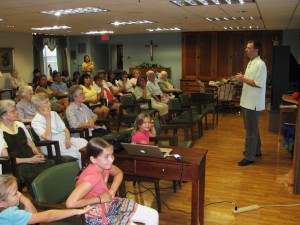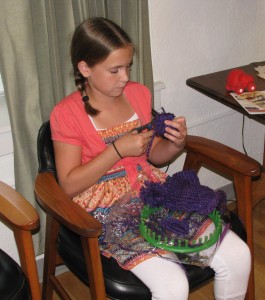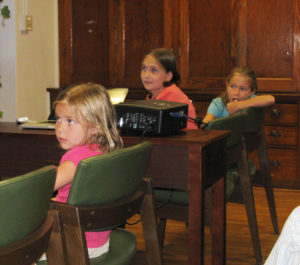Steve Zika addresses Ursuline Sisters and guests on July 21 in the St. Ursula Assembly Room.
Ursuline Sister Mimi Ballard learned to spin wool into yarn in 2006 so she could teach the women of Casa Ursulina in Chillan, Chile. Since then the women in the impoverished city have used the yarn to make scarves and other items to sell, but there’s been little market for direct sales of yarn.
That is about to change.
A family-run nonprofit organization called KidKnits is in the process of buying all the yarn the women of Casa Ursulina can make. The group already buys yarn from widows in Rwanda to provide them sustainable jobs, and sells craft kits for children to make wool hats. In need of more yarn than the Rwandan women can provide, the family went looking for another partner and found Casa Ursulina online.
“It is opening up a lot of possibilities for women to make money, women who are not in the program yet,” said Sister Ruth Gehres, who ministers with Sister Mimi in Chile. “They are asking for more than we can do now.”
Sister Ruth Gehres poses with some of the yarn that Sister Mimi Ballard brought with her from Casa Ursulina.
There are 14 women at Casa Ursulina spinning the yarn, but there will need to be more, Sister Mimi said. “They want 100 balls a month, before this we did 100 balls in six months to sell,” she said.
The women of Casa Ursulina market their finished weaving products through such outlets as Abbey Press or Handcrafting Justice, Sister Ruth said. Sister Mimi said without a previous market for the yarn, she doesn’t know how much the women at Casa Ursulina can produce. “We’re working the kinks out,” she said. Sister Mimi has already told the shepherd they work with that Casa Ursulina will buy all his wool when he shears his highlander sheep in November.
Some of the women in Chillan have become discouraged because they have trouble selling their creations, so it becomes more of a hobby than a job, Sister Mimi said. The jobs created will subsidize family income, but no one in Chillan will be able to support themselves solely on this income, Sister Mimi said.
Women who are in the most need will work in the program, while others may be able to help wash and prepare the wool, Sister Mimi said. “It’s got the women excited,” she said.
Ellie Zika, 11, knits a wool hat on her circle loom using yarn made by women in Chillan, Chile.
The story of KidKnits
Several sisters and guests were on hand July 21 in the St. Ursula Assembly Room at Maple Mount to meet the family behind KidKnits and hear its inspiring story. Steve and Kristin Zika, their daughters Ellie, 11, Cora, 8, Laynie, 6 and son Wally, 8 months, made the trip from Peoria, Ill., to talk to the group about the partnership potential.
The project began three years ago, when for Christmas, Kristin’s grandparents gave her the book “Left to Tell: Discovering God Amidst the Rwandan Holocaust” by Immaculee Ilibagiza. It told of her surviving the genocide in Rwanda by living in a 3 by 4 foot bathroom for 90 days. Kristin read the book for Lent all in one night, then ordered copies for people she knew and asked them to read it, Steve said.
The Zika family lived in Austin, Texas, and learned that Immaculee had given a talk in Peoria, Ill., where Steve and Kristin were raised. They decided to form a nonprofit group to raise money to bring Immaculee to Austin to speak in a theater that holds 1,250 people. “It connected us to Rwanda, and others who had a heart for Rwanda,” Steve said.
The three Zika girls watch their father as he talks with the sisters on July 21. From left are Laynie, 6, Ellie, 11, and Cora, 8.
Following the event, Immaculee was signing her book and a woman named Diana Wiley said she left her book at home. Kristin gave her one of her copies and told her to pass the book she had at home on to someone else. Inside the book were the names of the organizers of the event, and a week later the Zikas received an email from Wiley saying she was the co-founder of True Vineyard Ministries, with a goal to provide sustainable jobs to the widows of the genocide in Rwanda. She wanted to start a bakery there and asked the Zikas for help with a fundraiser. They met her in her office and saw a ball of yarn on her desk.
“She said the women in Rwanda have the capability to spin yarn, but they aren’t doing anything with it,” Steve said. Ellie, then 9, had just learned to make a wool hat on a round loom in her Girl Scout troop. “On the drive home, Ellie asked if we could get some more yarn from Rwanda,” Steve said. “She said, ‘If I could make some more hats, would that help the women in Rwanda?’” Cora and Laynie also knew how to make hats, and they wondered if they could get their friends to make some too. “We conceived of the craft kit and the name KidKnits all on that road trip,” Steve said.



